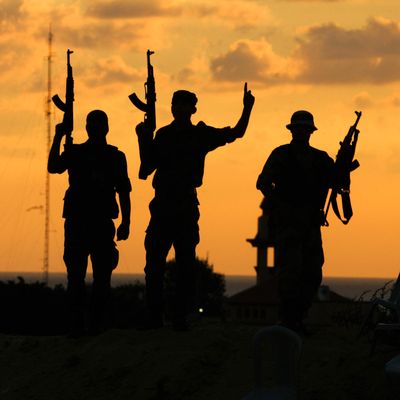
This morning, the Times, for the first time in a week, has some news to report that is bigger than the news it is generating itself. The FBI director, James B. Comey, who had been appointed in the expectation that he would help to roll back the global war on terror, told the paper that he had discovered in the nine months since taking over the agency that the United States now faces threats from a loose network of al Qaeda affiliates that are “stronger than I appreciated” before taking the job. This seems to be an emerging line coming from the administration. Keith Alexander, the director of the NSA, had made a less cogent version of the same argument to The New Yorker’s website last week, saying that the probability of terrorist attacks was “growing.” It is also a pretty explicit reversal of the president’s last major address on the issue.
Almost exactly one year ago, the president made a major speech at the National Defense University arguing that the “core of al Qaeda … is on the path to defeat,” and that the time had come to reconsider the policies that together made up the war on terror. Obama said then what many terrorism analysts had been saying for a few years, that the threat posed by al Qaeda was greatly diminished and had been replaced by lower-level “affiliate” groups, many of them concerned primarily with politics in their home nation, and without the global reach that al Qaeda once had. “So that’s the current threat,” the president said, in summing up, “lethal yet less capable al Qaeda affiliates; threats to diplomatic facilities and businesses abroad; homegrown extremists.” In the aggregate, he said, the current threat “closely resembles the types of attacks we faced before 9/11” rather than the more pressing crisis that provoked the global war on terror afterwards.
Comey and Alexander, interestingly, don’t exactly depart from this line. Instead, they evolve it, arguing that the remaining regional al Qaeda affiliates (for instance: al Qaeda in the Arabian Peninsula, al-Shabaab, al Qaeda in the Islamic Maghreb) actually are more dangerous to the United States than we have previously recognized. “I didn’t have anywhere near the appreciation I got after I came into this job just how virulent those affiliates had become,” Comey told the Times. Comey’s new stance is particularly interesting because of his reformist cred. He first became famous in 2004 when — as deputy attorney general during the Bush administration — he refused to sign off on a White House push to expand NSA authorities. His appointment had widely been seen as evidence that the national security apparatus was being recalibrated, with the FBI set to assume more traditional, quotidian responsibilities. But that it is the politic Comey making these statements (and not just the embattled, Strangelovian Alexander) suggests that the White House does not disagree.
Even after the death of bin Laden, the dismantlement of al Qaeda, the rolling Snowden scandals, and the president’s own carefully planned declaration that a new era had begun — it’s beginning to look like the Obama administration will end without having resolved one of the major questions that persisted as it began: Is the global war on terror going to be permanent?
If the argument from the administration is that our counter-terror apparatus is necessary because of the threats posed by the more diffuse, regional affiliates of al Qaeda, many of whom are active mostly against local targets, then that raises many interesting questions on its own. One is, how should the United States value non-American lives, and what resources should we devote to organizations that threaten them?
The current case of Boko Haram makes the complexities plain. That group menaces Nigerians and Cameroonians far more than it does Americans. Most commentators, and not just the #bringbackourgirls social media movement, seem to agree that the U.S. should help in some way to pursue them. But how much help, exactly? And do counter-terrorism operations directed against the Boko Harams of the world require the same sprawling infrastructure that was built to combat a centralized al Qaeda?
There are many more questions like this, and they are likely to be some of the most interesting dimensions of the last 30 months of Obama’s term, and to persist unresolved into the next presidential campaign. Which would itself be fascinating, with Obama’s secretary of State Hillary Clinton likely to be the front-runner, and Rand Paul, self-assigned nemesis of the national security state, one of her major challengers.





























